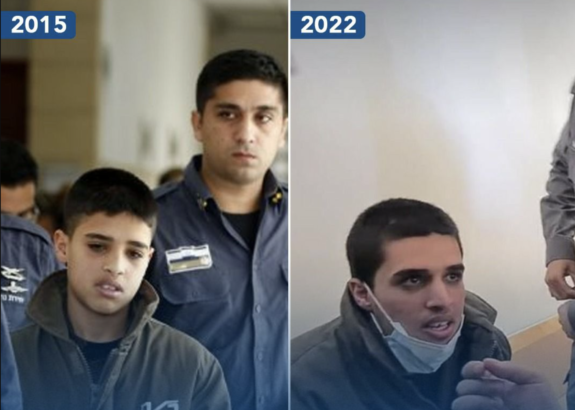Ahmad Manasra has endured years of harsh interrogations, abuse, and solitary confinement; mental health experts say his life is in danger – but Israel refuses to release him. Ahmad has served 6 years for a crime in which he did not participate.
by Mariam Barghouti, reposted from Mondoweiss, June 29, 2022
On Tuesday, 28 June, 20-year-old Palestinian prisoner Ahmad Manasra was denied early release by the Israeli parole board of Ramle prison.
The decision comes despite appeals by his defense team, which in light of his serious and deteriorating mental health condition, has petitioned for his release under Israel’s Parole Law of 2001.
In 2015, Manasra, who was only 13 years old at the time, was rammed by an Israeli vehicle and left to bleed on the ground after he and his cousin Hassan Manasra, 15, allegedly attempted to carry out a stabbing attack near the settlement of Pisgat Ze’ev in occupied Jerusalem.
Hassan was killed on the spot, and Ahmad was arrested by Israeli authorities, after he suffered internal bleeding and fractures to his skull.
The video of a young Ahmad’s contorted and bleeding body sprawled on the ground as an Israeli settler yelled at him in Hebrew “die, you son of a whore, die” quickly spread across local and international media outlets, and set the stage for one of the most high profile cases against a Palestinian in recent years.
Over the past year, Manasra’s lawyers and family have stepped up their campaign to demand his freedom, after years of harsh interrogations and abuse coupled with prolonged stents in solitary confinement which led to a severe deterioration of his mental health.
Presently, Manasra continues to suffer from health issues, induced by the injuries sustained when he was 13, followed by the ill-treatment and abuses forced on him by Israeli interrogators and armed forces. Mental health workers worldwide continue to demand that Israeli authorities release the now 20-year-old to afford him a chance at recovery.
According to Amnesty International, Manasra has been diagnosed with schizophrenia, suffers from psychotic delusions, and is “severely depressed with suicidal thoughts.”
Manasra’s lawyer, Khaled Zabarqa, told Amnesty earlier this month that the matter of Manasra’s release was urgent, as his mental health condition posed “a real danger to his life.”

Israel denies Ahmad Manasra’s health, well-being, and right to childhood
Following his punitive arrest in November 2015, Manasra was hospitalized due to the severe injuries sustained on the day of the alleged attack, and was chained to a hospital bed and reported to have been verbally abused by Israeli authorities and medical staff.
A month after his arrest, video footage of Manasra’s interrogation was made public, and showed the young boy being interrogated by three Israeli officers without the presence of his lawyer or parent.
The video caused widespread outrage, as the Israeli interrogators were seen shouting at, insulting, and threatening a visibly distressed Manasra in attempts to coerce him into a confession. During his interrogation he was also denied sleep, food, and right to legal representation. Distraught and in tears Manasra kept repeating “I don’t remember, I don’t remember.” A statement which became iconic in Palestinian circles of the abuses and duress he was under.
His lawyers also reported that Manasra was interrogated while under anesthesia, when he was neither fully aware nor in the presence of guardians. Palestinian minors commonly experience torture and ill-treatment, including illegal practices of physical abuse and psychosocial pressure.
Israel’s discriminatory judicial-civil-military apparatus
At the time of the reported attack in 2015, Israeli law stated that children under the age of 14 could not be held criminally responsible. Additionally, the courts found that Manasra did not actually participate in the stabbings.
Despite this, he was convicted of attempted murder in 2016 and sentenced to 12 years in prison, becoming the youngest Palestinian to be sentenced by the Israeli civil court. In 2017, his sentence was reduced from 12 years to 9.5 with a note that the “Probation Service’s impression that a long prison term may have undesirable consequences for him.”
In 2021, Physicians for Human Rights- Israel (PHRI), diagnosed Manasra with severe psychiatric conditions reported to have developed during the time of his imprisonment and torture. In April of this year, the organization warned that if Israel keeps Manasra imprisoned, it may lead to irreparable damage.
Although Israel ratified the Convention on the Rights of the Child in 1991 and the Optional Protocol to the Convention on the Rights of the Child on the involvement of children in armed conflict in 2005, it has de facto violated the rights of Manasra under interrogation, right to health services, and right to fair trial.
The appeal for Ahmad’s early release was reportedly denied under the pretext of classifying his file as “terrorism,” a blanket term leveled by Israel against Palestinians, including Palestinian children accused of carrying out attacks, or even Palestinian civil society organizations working to fight against Israeli apartheid.
In the months after his trial, Manasra’s case was used by right-wing Israeli politicians to push for, and eventually pass, the “Youth Law”, which enabled authorities to imprison minors as young as 12 years old when convicted of “terror-related” crimes.
The law has been common reference by armed Israeli police against Palestinian children accused of throwing stones.
Ahmad Manasra is victim of Israel’s pattern of prejudicial treatment
Dr. Netanel Dagan at the Center for Criminology in Oxford University, has examined more than 207 decisions by the Israeli parole board on “security prisoners” and found that that parole board’s design of “enemy parole” is “an exclusionary, punitive and exceptional process disguised as inclusionary, equal and legitimate.” The case of Ahmad Manasra appears exemplary of the ways in which Israel’s judicial system works in tandem with the illegal settler population and the military, even at the expense of childhood and youth.
Ahmad’s mother, still awaits for the moment she can hold her son once more “my son does not leave my thoughts for even a minute. May God protect him and return him to my embrace to chat with me.” Denied basic human rights, fair trial, childhood protection, legal justice, and now the right to preserve what little remains of his health.
FURTHER READING ON ISRAEL’S TREATMENT OF CHILDREN:
- After 15 years of blockade, 4 of 5 children in Gaza struggle with depression, grief & fear
- A Scarred Childhood: Israeli Attacks against Palestinian Children in the Occupied West Bank in 2022
- 53,000 Palestinian children detained by Israel since 1967
- Palestinian children held in solitary confinement by Israel surges
- Israeli soldiers illegally photograph Palestinian children in middle of night
FURTHER READING ON ISRAEL’S TREATMENT OF PRISONERS:
- When will Israel stop torturing Palestinian prisoners?
- Special Report: Israel’s Treatment of Americans
- Israel holds thousands of Palestinian prisoners in solitary confinement despite health risks
- Why were these Palestinian prisoners willing to die of starvation?
- Israeli NGO refers Israel to Int’l Criminal Court for torture of Palestinians
VIDEOS:





